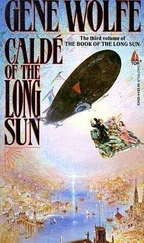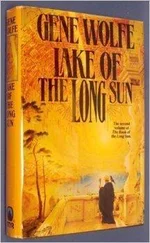Wolfe, Gene - The Best of Gene Wolfe
Здесь есть возможность читать онлайн «Wolfe, Gene - The Best of Gene Wolfe» весь текст электронной книги совершенно бесплатно (целиком полную версию без сокращений). В некоторых случаях можно слушать аудио, скачать через торрент в формате fb2 и присутствует краткое содержание. Жанр: Старинная литература, на английском языке. Описание произведения, (предисловие) а так же отзывы посетителей доступны на портале библиотеки ЛибКат.
- Название:The Best of Gene Wolfe
- Автор:
- Жанр:
- Год:неизвестен
- ISBN:нет данных
- Рейтинг книги:5 / 5. Голосов: 1
-
Избранное:Добавить в избранное
- Отзывы:
-
Ваша оценка:
- 100
- 1
- 2
- 3
- 4
- 5
The Best of Gene Wolfe: краткое содержание, описание и аннотация
Предлагаем к чтению аннотацию, описание, краткое содержание или предисловие (зависит от того, что написал сам автор книги «The Best of Gene Wolfe»). Если вы не нашли необходимую информацию о книге — напишите в комментариях, мы постараемся отыскать её.
The Best of Gene Wolfe — читать онлайн бесплатно полную книгу (весь текст) целиком
Ниже представлен текст книги, разбитый по страницам. Система сохранения места последней прочитанной страницы, позволяет с удобством читать онлайн бесплатно книгу «The Best of Gene Wolfe», без необходимости каждый раз заново искать на чём Вы остановились. Поставьте закладку, и сможете в любой момент перейти на страницу, на которой закончили чтение.
Интервал:
Закладка:

AFTERWORD
This was the pivotal story that changed my life. The truly strange thing was that I knew it would do it before it had done it. Damon Knight’s Orbit was my main market back then; I had sold Damon several stories, been invited to his Milford Writer’s Conference, and gone (I think twice).
He bought this story and praised it. When I said I wanted it to be my next conference story he very reasonably objected that it did not require fixing. I told him I wanted to hear what others said about it, and eventually won him over.
The time came. We had just bought a new car, small and cheap—but brand-new. I was returning to the Milford Conference (which I loved) with a story I felt certain was good. Ten or twenty miles from Milford, Pennsylvania, I topped a hill and saw yellow dots in the road. They were goldfinches, and as my new car drew nearer they flew up, a golden shower rising from the earth. There are no words to describe how happy I was at that moment, when I felt that a whole new life was opening before me.
It was perfectly true. One was.
BEECH HILL
B
ubba goes off by himself like this every year—don’t you, Bubba?” So Maryanne had said, and looked venomously at Bobs. He recalled it as he sat in Beech Hill pretending to read, his legs primly together, his back (because, no longer young, it hurt if he sat on his spine) straight.
“I suppose he needs it. Uh . . . needs the rest.” Thus Mrs. Hilliard, a friend of Maryanne’s friend Mrs. Main.
“That’s what I always say. I say: ‘Bubba, God knows you work hard all year. We don’t have much money, but you go off by yourself like you always do and spend it. I can get around in my chair perfectly well, and anyway Martha Main will come over to look after me. Nobody ought to have to take care of a cripple forever, but if it wasn’t for Martha I don’t know what I’d do.’ ”
Mrs. Hilliard had asked, “Where do you go, Mr. Roberts?”
S
omeone came in, and Bobs looked up and saw the countess, black hair stretched tight around her after-midnight face. His watch said seven and he wondered if she had been up all night.
At seven, fifty-one weeks of the year, he was at work. He looked at the watch again. Twelve hours later he and Maryanne had dinner, again at seven. Afterward he read while she watched television. At six he would get up, and at seven relieve the night man.
Bishop came in, followed by a young man Bobs had not seen before. The young man was pale and nervous, Bishop portly and assured behind mustache, beard, eyebrows, and tumbling iron-gray forelock. “You’re among us early this morning, Countess.”
“I could not sleep. It is often so.”
Bishop nodded sympathetically, then gestured toward the young man beside him. “Countess, may I present Dr. Preston Potts. Dr. Potts is a physicist and mathematician—the man who developed the lunar forcing vectors. You may have heard of him. . . .”
More formally he said to Potts, “Dr. Potts, the Countess Esterhazy.”
“I have heard of Dr. Potts, and I am charmed.” The countess held out a limp hand glittering with rhinestones. “I at first thought you were a doctor who might give me something for my not sleeping, but I am even so charmed.”
Potts stammered: “Our a-a-astronauts have trouble sleeping too. If you imagine you’re in space it might help you f-f-feel better about it.”
The countess answered, “We are all in space always, are we not?” and smiled her sleepy smile.
For a moment Potts stood transfixed; then he managed to smile weakly in return. “You are something of a mathematician yourself. Yes, we are all in space or we would not exist—perhaps that’s why we sometimes have trouble sleeping.”
“You are so clever.”
“And this is Mr. Roberts,” Bishop continued, drawing Potts away from the countess. “I cannot tell you a great deal about Mr. Roberts’s activities, but he is one of the men who protect the things you discover.”
Bobs stood to shake hands and added: “And who occasionally arrange that you discover what someone else has just discovered on the other side. Pleased to meet you, Dr. Potts. I know your work.”
“Looks a lot like Bond, doesn’t he?” he overheard Bishop say as the two of them left him. “But he’s different in one respect. Our Mr. Roberts is the real thing.”
Bobs sat down again. There was a Walther PPK under his left arm, but it was no help and he felt unsettled and a little afraid. Behind him, at the far end of the big room, Bishop was introducing Potts to someone else—Claude Brain, the wild animal trainer, from the sound of the voice—and Bobs caught the words: “Welcome to Beech Hill.”
E
ach year he came to Beech Hill by bus, with an overnight stop. The stop had, itself, become a ritual. In fact, the entire trip from the moment he carried his bag out of the apartment was marked with golden milestones, events that were—so strong was the anticipation of pleasure—pleasures themselves.
To enter the terminal and buy his ticket, to sit on the long wooden bench with the travel worn, with the servicemen on leave, with the young, worried, cheaply clothed women with babies and the silent, shabby men (like himself) he always hoped were going to their own Beech Hills but who, in their misery, could not have been.
To sit with his bag between his feet, then carry it to be stowed in the compartment under the bus’s floor. To zoom the air-conditioned roads and watch the city slip behind. The hum of the tires was song, and if he were to fall asleep on the bus (he never did) he would know even sleeping where he was.
And the stop. The hotel. A small, old, threadbare hotel; they never put him in the same room twice, but he could walk the corridors and recall them all: Here’s where, coming, in ’62. There in ’63. The fourth floor in ’64 . He stayed at the hotel on the return trip as well, but the rooms, even last year’s room, faded.
Checking in, he always asked if they had his reservation, and they always did. A card to sign— R. Roberts, address, no car .
And the room: a small room on an air shaft, bright papered walls with big flowers, a ceiling fixture with a string. And the door, a solid door with a chain and dead bolt. Snick! Rattle! His bag on the bed. Secret papers on the bed. Not NOW, Maryanne, I’m not decent . His hand on the Luger. If Maryanne should see those—It would be his duty, and the Organization would cover for him as it always did. . . . Suppose she hadn’t heard him? Come in—Snickback!—Maryanne, Rattle! His own sister, they say. There’s devotion for you!
H
e always changed at the hotel the day he arrived, not waiting until morning. This time too, he had removed his old workaday clothes, showered, and, glowing, gone to the open bag for new, clean underwear bought for the occasion—and executive-length hose. His shirt of artificial fabrics that looked like silk stayed new from year to year; he wore it only at Beech Hill. His slacks were inexpensive, but never before worn.
He was proud of his jacket, though it had been very cheap, an old Norfolk jacket, much abused (by someone else) but London made. The elbows had been patched with leather; the tweed smelled faintly of shotgun smoke, and the pockets were rubber lined for carrying game. Handy in my line of business . Just the sort of coat the right sort of man would continue to wear though it was worn out, or nearly. Also just the sort to effectively conceal his HSc Mauser in his shoulder holster—at Beech Hill.
But not at the stop. Regretfully he left the Mauser in his bag, but this too was part of the ritual. The empty holster beneath his arm, the strange clothes, told him where he was. Even if he had fallen asleep . . . (but he never did.)
Читать дальшеИнтервал:
Закладка:
Похожие книги на «The Best of Gene Wolfe»
Представляем Вашему вниманию похожие книги на «The Best of Gene Wolfe» списком для выбора. Мы отобрали схожую по названию и смыслу литературу в надежде предоставить читателям больше вариантов отыскать новые, интересные, ещё непрочитанные произведения.
Обсуждение, отзывы о книге «The Best of Gene Wolfe» и просто собственные мнения читателей. Оставьте ваши комментарии, напишите, что Вы думаете о произведении, его смысле или главных героях. Укажите что конкретно понравилось, а что нет, и почему Вы так считаете.









